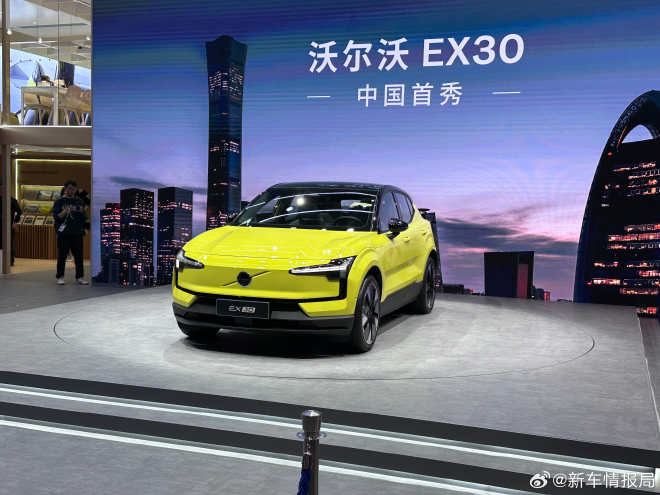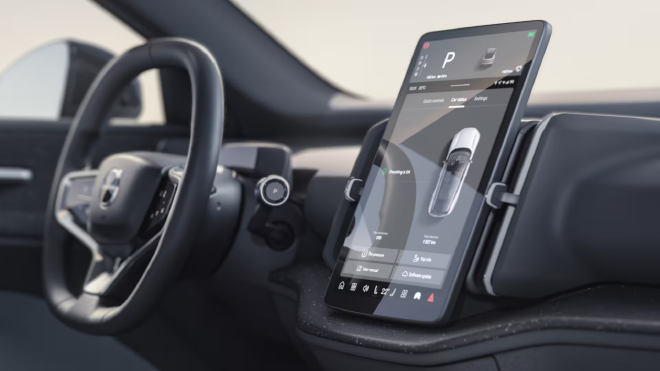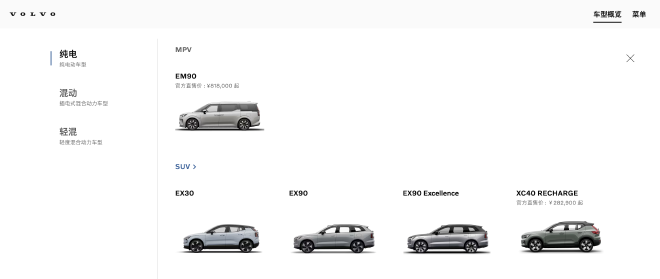In a competitive market, traditional luxury brands face challenges from Chinese brands. Volvo performed well in the first quarter. Sales increased by 12% to 182,687 units from January to March. The growth was driven by traditional fuel models and discounts. In the era of electrification and smart technology, Volvo needs to launch a popular new energy vehicle to maintain long-term advantage.
At the recent Beijing Auto Show, Volvo officially launched the EX30 model in the Chinese market. This model, which was released overseas six months ago, has been well-received in the European and American markets, with sales exceeding 10,000 units in March. “We hope Chinese users can experience the charm of this overseas hit as soon as possible,” said Yu Kexin, President of Volvo Cars Greater China Sales, in a media interview. The EX30 is aimed at a wider range of young users. If last year’s flagship MPV EM90 aimed to elevate the Volvo brand, then the EX30 is designed to attract a broader range of young users. With a length of less than 4.3 meters and a wheelbase of 2.65 meters, this compact model is packed with features. It comes equipped with Harman Kardon’s sound system, a range of up to 590 kilometers, and a 0-100 km/h acceleration in 3.6 seconds. The pre-sale price ranges from 210,000 to 260,000 yuan (35880$). According to Volvo, this is a “small yet powerful” car. Despite Yu Kexin stating that “we don’t have too much sales pressure for this car,” the pre-sale price of the EX30 is lower than its overseas price.
From EX30, you can see Volvo’s thinking on luxury in the new energy era. “Now the market is all about configurations and sizes. But do we really need all those functions? I think it’s worth exploring,” said Yu Kexin, introducing the design concept of EX30. Targeting young people, especially newlyweds, especially in congested cities like Beijing, Shanghai, and Guangzhou, EX30 “focuses more on driving, on driving pleasure,” and “is very user-friendly, especially for female users,” as evidenced by EX30’s cumulative sales of over 20,000 units in Europe and North America. Yu Kexin also emphasized, “EX30 has won more than 20 awards in 7 countries overseas,” receiving wide acclaim globally as a true global model, carrying the responsibility of conveying Volvo’s values to users. In addition to the traditional “safety, environmental protection, sustainability,” Volvo also has complete in-house ADAS capabilities. At the same time, they have designed a “subtractive aesthetic” infotainment system for EX30, making it easier for drivers to control functions and operate the screen, supporting customization for a more relaxed and convenient driving experience.
This “subtraction aesthetics” car machine is unique, believed to be as Ke Xin said, “there is always a group of people who like simple but not simple design.” Driving dealers to digital transformation This year’s Beijing Auto Show should be the busiest one for executives. In the past two days of media day, many heads of car companies started live streaming to attract attention and traffic. Ke Xin understands this, “there are too many brands in the current car market,” but “Volvo has achieved digital-driven process management, mastering accurate data of the entire sales chain through the NEWBIE system, improving the overall efficiency of the system.” The NEWBIE system is a management system that Volvo uses digital means to connect users, dealers, and OEMs’ data, “covering the entire lifecycle of customer buying and using cars, forming a complete system chain from leads, entering the store, selecting cars, buying cars, and repairing cars.” In Ke Xin’s view, facing the requirements of electrification and digitization transformation in the era of new energy, Volvo must adhere to the service concept of “customer-centric,” from the bottom-up thinking, “follow the consumers, wherever consumers like to go, we will be there.” Volvo will focus on the user experience throughout the entire lifecycle, driving comprehensive changes in enterprise operations, organizational structure, brand building, sales channel models, digital management, and other aspects, and do a good job in transitioning to the end consumer. By bringing users, companies, and dealers together through digital technology, according to Ke Xin, Volvo will “transform with more than 300 4S dealers between 2025 and 2030, launching several new products every year. By then, with more products and profits for dealers, customers accepting the brand, the transformation will be successful.” Building a product matrix with safety as the core Ke Xin once again emphasized Volvo’s positioning of the EX30, “This year, we shot many very artistic films for EX30 around the world, such as the UK, Italy, etc.,” “Why did we launch the EX30? It is to target a younger consumer.” Ke Xin further explained, “We need a small product to connect with customers, let young people understand Volvo. Understanding Volvo is a humanistic world car, it has its own style,” “If we don’t let the new generation of customers understand Volvo, communicate the safety genes with consumers, they may forget about Volvo.”
As time goes on and new models are released, Volvo’s future product lineup will consist of more than just the current two products. The D-SUV, D-car, E-SUV, and E-car will form a complete electrified product matrix. Regardless of price and level, Volvo’s brand proposition remains unchanged, with safety at its core, providing consumers with a sense of security. Volvo’s product powertrain planning takes into account the different climates, environments, and terrains of each region. The future product lineup will still include gasoline, hybrid, and electric vehicles, with pure electric and plug-in hybrid models expected to account for over 50%. In the competitive era of new energy, Volvo, like every other car manufacturer, is feeling the pressure. To tell its brand story effectively, Volvo needs to “maintain brand differentiation, strengthen safety awareness, and continuously provide users with a sense of security.” By focusing on “safety + intelligence” as its core, Volvo aims to create a new platform, with the EX90 as the most essential product for expansion. This expansion targets customers at the million level and extends down to young consumers. Now, with the responsibility of attracting young people, the global model EX30 faces the question of whether it can replicate its success in the European and American markets in the Chinese market, which only time will tell.



